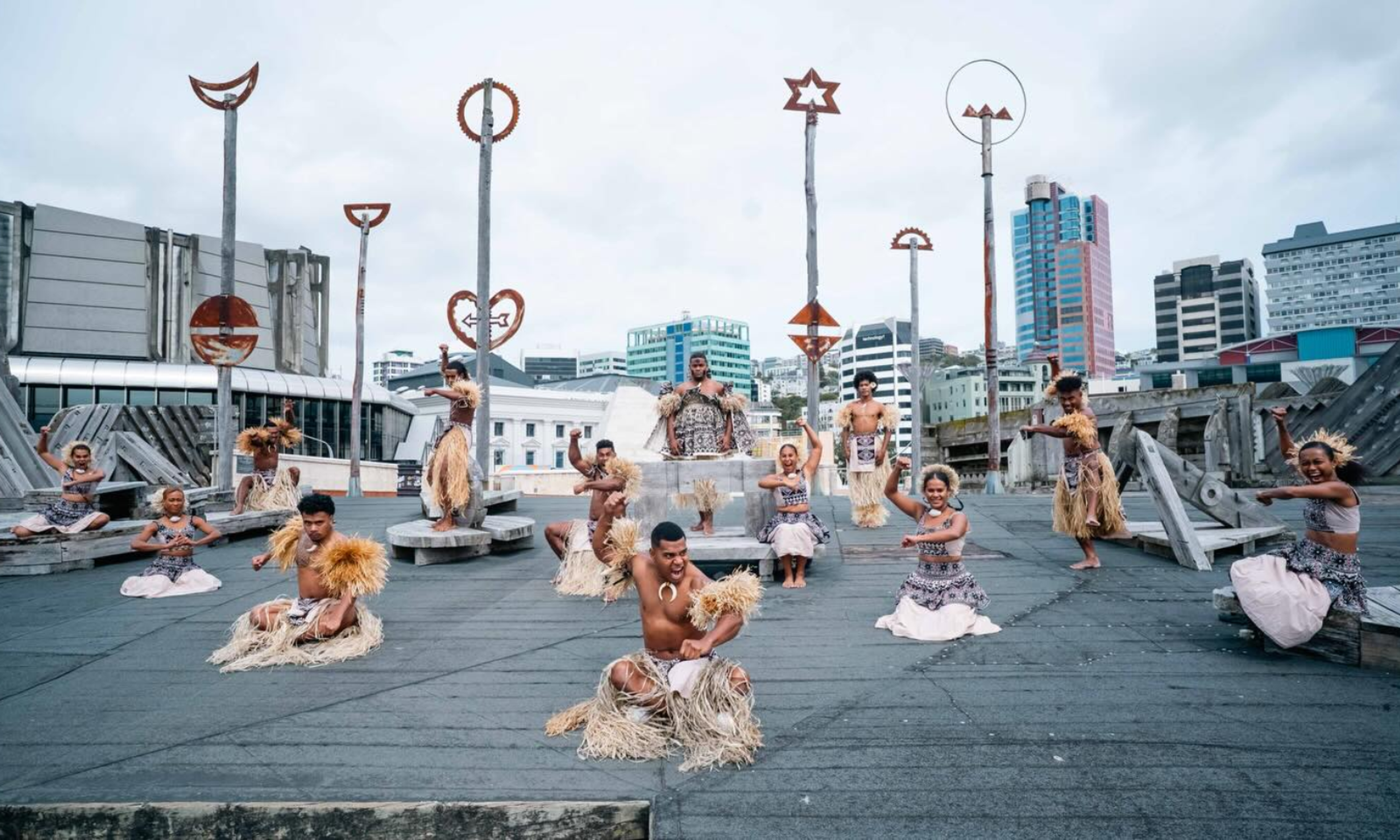

Scenes on the ground at ASB Polyfest’s opening flag-raising and pōwhiri ceremony on Tuesday.
Photo/PMN News/Candice Ama
Polyfest50: A journey of reflection, cultural pride and reconciliation
The iconic festival, born amid the challenges of the Dawn Raids, opened on Tuesday with a heartfelt apology from Tonga and renewed hope for the future.



Pacific digital-finance push continues despite global crypto volatility




‘Shot put queen’ Dame Valerie Adams leads Pacific pride at NZ's Halberg Awards 2026

Pacific digital-finance push continues despite global crypto volatility


The Polyfest 50th opening ceremony on Tuesday was filled with reflection, reconciliation, and the desire to build anew between Pacific people and Māori for the next generation.
Polyfest 2025 returns to the Manukau Sports Bowl in Auckland this week, where more than 11,000 students from 77 schools will participate across six cultural stages, ending on Saturday.
Tainui led the opening flag-raising ceremony moments before sunrise. Kaumātua and the ASB Polyfest Board overseeing proceedings, joined by students raising flags from the Cook Islands, Diversity, Niue, Māori, Sāmoa, and Tonga groups.
Reflecting on Polyfest's since its inception during the infamous 1970s Dawn Raids era, Aupito William Sio, former Minister for Pacific Peoples, says Tuesday’s event is “a product of young people”.
He mentions Michael Rollo, who played a key role in forming the first Polyfest in 1976, and how Rollo’s inspiration stemmed from a trip to China.
“China celebrated everything, from harvest to birth, weddings, Rollo was amazed by it, and we didn't do enough of that in Aotearoa New Zealand,” Aupito says.
“So Rollo and a group of sixth and seventh formers presented to the school assembly, and we endorsed the idea for a Māori Polynesian festival. The Pacific got added into it because there were a lot of us at [James Cook High School].”
The inaugural Polyfest in 1976, initially known as the Auckland Secondary Schools’ Māori and Pacific Islands Cultural Festival, was hosted by Hillary College and included three other schools: Aorere College, Māngere College, and Seddon High School. It featured six groups and 40 performers.
“It was a vision by young people to celebrate our language and culture so it's grown from those schools to 77 schools that we have today,” Aupito says.

Aupito William Sio in attendance. Photo/PMN News/Candice Ama
1996 Polyfest incident apology
After the flag-raising ceremony, a pōwhiri was led by Ngā Puna o Waiōrea and Kia Aroha Campus with waiata (songs), karanga (welcome call) from Tainui kuia, followed by a Conch and Haka Pōwhiri by the mentioned colleges.
Mihi and responses were exchanged between Tainui kaumātua, Auckland City Representative He Tukuhanga Aroha Alf Filipaina, and officials from the Cook Island Māori, Tongan, Sāmoan, and Niuean stages.
Vaivaifolau Kailahi, chief judge for the Tonga Stage, delivered a formal apology for an incident that happened during the 1996 Polyfest when Princess Salote Mafile’o Pilolevu Tuita was the guest of honour.
During the pōwhiri, the Tongan national anthem was played, which upset “the mana, the sacredness of the pōwhiri”.
Kailahi apologised in both English and te reo Māori, engaging in poetic prose, following Tongan custom, titled “A sorrowful apology from the tauiwi [foreigner] to the tangata whenua of Aotearoa”.
Representatives on behalf of Kīngitanga acknowledged and supported “Te Whare Tapu o Tonga [The Sacred House of Tonga]” and Kailahi’s apology.

Tongan Stage Chief Judge Vaivaifolau Kailahi. Photo/PMN News/Candice Ama
“There's a saying: 'If service is beneath you, then leadership is beyond you'. Te Whare Tapu o Tonga, the leadership of manaakitanga [respect, care], of humility and acknowledgement.”
After the ceremony, Kailahi says that although he felt nervous about delivering the apology, it was important to clear the air for future unity.
He says “heavy hearts” have been carried since that 1996 incident, and the 50th anniversary serves as an opportunity to reflect and make amends.
“It's not something that you can just chuck aside and say it's okay,” Kailahi says.
“Now we have clear air that we made a mistake, we learned, we make amendments, we acknowledge the Māori tikanga, manaakitanga and all.”
He says the response from kaumātua and representatives of the Māori Queen has been “very touching”, adding that he will “sleep well tonight”.

Tangaroa College students Junior Talei, left, and Kennedy Tau'aso Tasi Tapumanaia. Photo /PMN News/Candice Ama
Next generation
Aupito emphasises the importance of reflection for Māori and Pacific people during Polyfest, recalling the painful environment in which the festival was founded.
He says that forgiving but not forgetting is key and encourages the youth to continue learning about New Zealand, the Pacific, and Māori history, especially since “we’re now making Aotearoa New Zealand our home”.
Tangaroa College students Junior Talei and Kennedy Tau'aso Tasi Tapumanaia echo the importance of this moment, saying that being a part of the generation that will uphold the annual event’s half-century legacy is an honour.
“It's a real honour to perform and to carry out the generations of Polyfest,” Tapumanaia says.
“We feel honoured, grateful and lucky to have the freedom we have right now to perform, embrace and display our culture and just to make our grandparents proud,” Talei says.

Early morning flag-raising ceremony. Photo/PMN News/Candice Ama

The sun rises post-flag-raising ceremony, before the pōwhiri ceremony. Photo/PMN News/Candice Ama

Auckland Councillor Alf Filipaina speaks at the pōwhiri. Photo/PMN News/Candice Ama

Students in attendance. Photo/PMN News/Candice Ama

Crowds at ASB Polyfest’s 50th opening ceremony. Photo/Paul Lisi